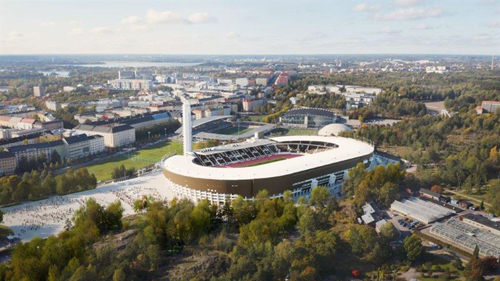Stora Enso and Helsinki Olympic Stadium have signed a partnership agreement to develop low-carbon, eco-friendly operations at the stadium by promoting the use of renewable materials and circular economy solutions. Stora Enso explores reusing products as well as recycling used materials to give high-quality wood fibers a second life in new products that will be available at the stadium for different services and operations.
Stora Enso and Helsinki Olympic Stadium share the aim of promoting the use of renewable materials in customer and food service packaging to reduce the climate impact of stadium operations. In addition, the aim is to ensure that materials get recycled to a high degree.
Olympic Stadium promotes the goal of a carbon-neutral Helsinki by 2035 in accordance with the Helsinki City Strategy 2017–2021. Circular economy solutions are enabled through cooperation with partners of the Olympic Stadium, including the food and catering service company Compass Group and the future recycling partner. A common aim for all is to promote the use of renewable materials and circular economy solutions at the stadium. Stora Enso’s renewable materials portfolio and expertise in eco-friendly and circular economy solutions are utilised in the partnership.
“The Olympic Stadium is an arena of sustainable development and the circular economy in the built environment as a whole. Environmental impact reduction by extending the building’s life cycle was one of the fundamental premises for the whole modernization and updating of Helsinki Olympic Stadium. In cooperation with Compass Group and Stora Enso, we will continue the sustainable development required for putting on environmentally conscious operations at the stadium,” says Marju Paju, Director of Marketing and Communication for Olympic Stadium.
“Sustainability and responsible sourcing are amongst Compass Group’s core principles and have been at the heart of the restaurant and catering services design and planning process at Helsinki Olympic Stadium. It is an exceptional venue and deserves exceptional solutions. After restrictions on gatherings are lifted, we may serve up to 55,000 visitors during a single event, so we are extremely committed to finding the right package solutions. The partnership between Olympic Stadium and Stora Enso allows us to do just that,” says Kristiina Ramirez, Director, Concession Accounts Finland.
Helsinki Olympic Stadium offers the ideal venue for piloting circular economy concepts along the value chain, from selecting renewable and circular materials to collection, sorting and recycling of used materials. Making new products out of used materials gives valuable raw materials a second life. For example, Stora Enso is able to recycle the high-quality fibre of paper cups used in the stadium for new products.
“Renewable materials are key in the transition from a fossil-based world to a circular economy, and by cooperating with Helsinki Olympic Stadium we can demonstrate the benefits in practice. Consumers have the opportunity to enjoy low-carbon, circular economy operations and they can contribute to sustainability by ensuring they recycle materials,” says Hannu Kasurinen, EVP, Packaging Materials Division at Stora Enso.




